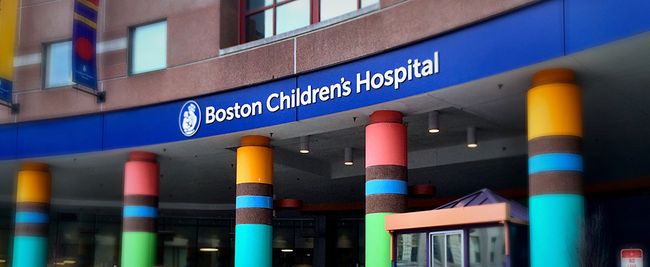The Hospitals of the Program
Boston Medical Center – Primary Institution
Boston Children’s Hospital
Lahey Clinic
Massachusetts General Hospital – Orthopaedic Oncology Service
Boston Veterans Administration Health Care System
The program comprises approximately 220 active orthopaedic beds, and the more than 40 full time faculty perform over 9000 orthopaedic procedures annually. In addition to the wealth of clinical material from which the residents’ education draws, a funded 3,500 square foot state of the art basic science laboratory headed by full time research faculty supports the residents’ scientific development. The basic science faculty and staff are on the cutting edge of research related to the biology of fracture repair and the regeneration of musculoskeletal tissues. Finally, a well stocked library and a bio-skills laboratory dedicated exclusively to the education of orthopaedic residents is accessible 24 hours a day.
Boston Medical Center – Primary Institution
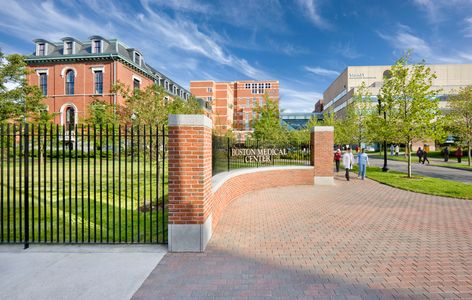
Orthopaedic residents get the majority of their trauma experience at the medical center, which sees more than 2,000 trauma admissions each year. The medical center serves as a tertiary referral center for complex trauma and spine problems for a three state area. Four rotations at the medical center focus the resident experience on trauma, pediatrics/hand, spine, and reconstruction/sports. The bulk of the educational schedule occurs at the main medical center and the largest proportion of residents are at the medical center. The rotations are set up so that each resident spends a significant amount of time with one attending, allowing a close interaction over months. This one on one teaching in the clinic and the operating room creates a concentrated learning experience in each major orthopaedic area. For more information on Boston Medical Center click here.
Boston Children’s Hospital
Residents will spend approximately 1/5 of their PGY4 year at Boston Children’s Hospital doing a rotation in
pediatric orthopaedics. During this rotation, residents will have the opportunity to work with the faculty in the Department of Orthopaedic Surgery in the operating room, in the outpatient clinic, and managing on-call
duties. All faculty are fellowship trained pediatric orthopaedic surgeons, and many are double fellowship trained
with subspecialty areas of expertise (e.g. pediatric sports medicine, pediatric hand surgery, etc). In efforts to ascertain that rotating residents will have ample opportunity to care for acute pediatric orthopaedic trauma, trainees will spend time each week doing daytime orthopaedic trauma cases as well as taking evening/weekend call.
Our goal is to provide an equal balance of surgical and clinic time each week. Along with other rotating PGY3
trainees from the Harvard, Dartmouth, and Lenox Hill programs, residents will share responsibility for ED coverage throughout each week. Daytime ED coverage as well as night/weekend call is equally shared amongst all rotating residents, with coverage schedules determined and distributed in advance. This allows for “protected” time during elective surgical cases and outpatient clinics. In addition, inpatient and ED coverage support is provided by our team of mid-level providers in efforts to maximize educational time spent in clinic and the OR. There are weekly conferences and educational programs which all residents are required to attend. These include but are not limited to: 1) Monday morning “fellows conference” 2) Tuesday morning “core lectures in pediatric orthopaedics” 3) Thursday morning “Chief’s conference” 4)Friday morning “indications conference” 5) Daily morning “trauma rounds” 6) Monthly Morbidity and Mortality conference 7) Monthly journal club 8) Periodic simulation training. For more information, please click here.
Lahey Hospital & Medical Center
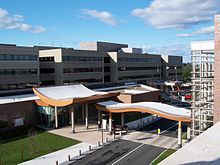 Residents spend 12 months of their residency at the Lahey Hospital. There are five rotations at Lahey; the PGY2 rotates on Foot & Ankle, the PGY3 on Hand, a PGY4 on Joints, another PGY4 on Sports, and the PGY5 rotates on Trauma and Hip Preservation. Residents rotate with the same faculty in clinic and the operating room during their rotation to enhance preoperative and postoperative exposure for continuity. They spend 1 to 2 days in clinic per week. Each rotation has an Attending Team Leader that is in charge of the service and mentors the residents. The residents are free of ED responsibilities during the regular workday, and cover the ED nights and weekends along with inpatient management and the operating room for after hour cases. Residents participate in perioperative management of patients along with physician extenders and faculty during daily patients rounds.
Residents spend 12 months of their residency at the Lahey Hospital. There are five rotations at Lahey; the PGY2 rotates on Foot & Ankle, the PGY3 on Hand, a PGY4 on Joints, another PGY4 on Sports, and the PGY5 rotates on Trauma and Hip Preservation. Residents rotate with the same faculty in clinic and the operating room during their rotation to enhance preoperative and postoperative exposure for continuity. They spend 1 to 2 days in clinic per week. Each rotation has an Attending Team Leader that is in charge of the service and mentors the residents. The residents are free of ED responsibilities during the regular workday, and cover the ED nights and weekends along with inpatient management and the operating room for after hour cases. Residents participate in perioperative management of patients along with physician extenders and faculty during daily patients rounds.
Work hours are reviewed and managed by the residency director at Lahey, Andrew Marcantoni0, DO and monitored by the PD. Residents also participate in a pre-operative case conference that addressed operative indications. The team of residents meet every morning with the on-call Attending and the Trauma Attendings to review admissions, consults, and address inpatient care issues, which include the perioperative management of patients. Additionally, a weekly conference is held where attending surgeon’s present patients to residents for a discussion of diagnosis, treatment options and indications for surgical treatment. On a rotating basis, at this weekly conference, residents also participate in Morbidity and Mortality Conference, Grand Rounds presentations, and Journal Club. Subspecialty monthly Conferences for Hand and Adult Reconstruction that residents are invited to attend. For more information on the Lahey Clinic click here.
Massachusetts General Hospital – Orthopaedic Oncology Service
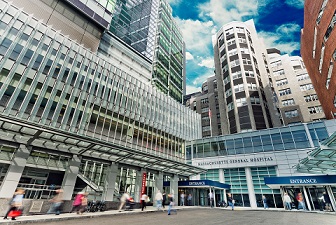 The Orthopaedic Oncology Service at Massachusetts General Hospital provides world-class, compassionate care to children, adolescents and adults with a team approach to treating primary bone and soft tissue tumors (benign and malignant) and metastatic disease.
The Orthopaedic Oncology Service at Massachusetts General Hospital provides world-class, compassionate care to children, adolescents and adults with a team approach to treating primary bone and soft tissue tumors (benign and malignant) and metastatic disease.
The Program was founded in 1972 by Dr. Henry Mankin, the then Chairperson of Orthopaedics. The program is now the largest oncology treatment group in New England and one of the largest in the world.
Approximately 200 patients are seen per week including an average of 800 new patients annually with tumors of bone and soft tissues. The group performs approximately 700 operations per year and maintains an active educational and research program. For more information on the Oncology Service at Massachusetts General Hospital click here.
Boston Veterans Administration Medical Center
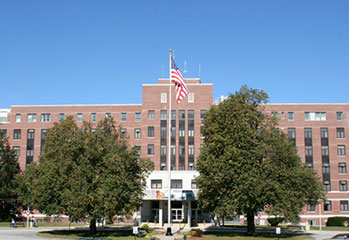 The Boston VA Medical Center is a tertiary care institution dealing exclusively with the medical and surgical needs of the veteran population. This facility provide the residents with a balanced experience in a general and subspecialty orthopedic practice which includes the presence of five attendings, residents, a hand fellow, interns and medical students of different levels of training and from different training programs. During their rotation at the Boston VA Medical Center, the residents are exposed to the treatment of acute and chronic pathologies affecting veterans with multiple orthopedic problems, including degenerative arthritis of the upper and lower extremities, acute traumatic injuries, sequalae from war injuries, sports medicine related conditions, hand and upper extremity diseases, foot and ankle diseases, infections and musculoskeletal tumors. More autonomy is available for the resident at the VA than other hospitals in the system. For more information on Boston VA Medical Center click here.
The Boston VA Medical Center is a tertiary care institution dealing exclusively with the medical and surgical needs of the veteran population. This facility provide the residents with a balanced experience in a general and subspecialty orthopedic practice which includes the presence of five attendings, residents, a hand fellow, interns and medical students of different levels of training and from different training programs. During their rotation at the Boston VA Medical Center, the residents are exposed to the treatment of acute and chronic pathologies affecting veterans with multiple orthopedic problems, including degenerative arthritis of the upper and lower extremities, acute traumatic injuries, sequalae from war injuries, sports medicine related conditions, hand and upper extremity diseases, foot and ankle diseases, infections and musculoskeletal tumors. More autonomy is available for the resident at the VA than other hospitals in the system. For more information on Boston VA Medical Center click here.
